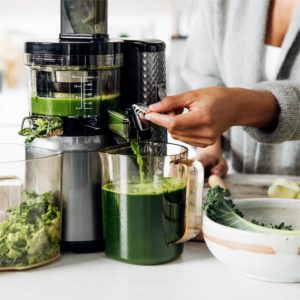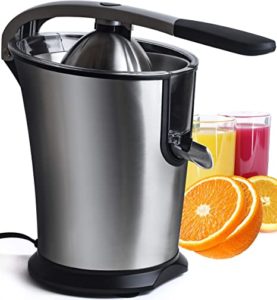In recent years, juicing, the process of extracting nutritious juices from fresh fruits and vegetables has gained popularity.
Numerous individuals use it to detox or increase their nutrient intake. Others argue that juicing removes essential nutrients, such as fiber, from fruits and vegetables, contrary to the claims of juicing proponents.
This is a comprehensive analysis of juicing and its positive and adverse health effects.
What is juicing?
The process of juicing involves extracting the juices from fresh fruits and vegetables. Whole fruits and vegetables are typically stripped of most of their solid matter, such as seeds and pulp.
The resulting liquid contains:
- Most of the naturally occurring vitamins.
- Minerals.
- Antioxidants in the whole fruit or vegetable.
Juicing methods
Juicing techniques range from hand-squeezing fruit to motorized juicers.
Two frequent varieties of juicers include:
- Centrifugal. It utilizes a high-speed spinning action with a cutting blade; these juicers reduce fruits and vegetables to a pulp. Additionally, the spinning separates the liquid from the solids.
- Cold press. These juicers, also known as masticating juicers, crush and press fruits and vegetables much more slowly to extract the maximum amount of juice.
The nutritional value of juice produced by centrifugal and cold-press machines is comparable.
Purpose of juicing
Generally, juicing serves two purposes:
- Cleansing or detoxification: Solid foods are eliminated for three to several weeks, and only juice is consumed as part of a cleansing or detoxification program. Some people believe that drinking juice removes toxins from their bodies. However, there is no evidence to support its efficacy.
- Supplementing a regular diet: Fresh juice can be a valuable addition to your daily diet, allowing you to consume nutrients from fruits and vegetables that you would not otherwise consume.
Juice is a convenient way to obtain many nutrients.
Numerous individuals need more nutrients from their diet. In addition, the nutrient content of the foods you eat is significantly lower than it once was.
This is attributable to processing techniques and the time required to transport produce from the farm to the supermarket. Additionally, polluted environments and high-stress levels can increase your need for certain nutrients.
Fruits and vegetables are rich in disease-preventing vitamins, minerals, antioxidants, and plant compounds. If you struggle to consume the daily recommended number of fruits and vegetables, juicing can be a convenient way to increase your intake.
A 14-week supplementation with mixed fruit and vegetable juice improved the participants’ beta-carotene, vitamin C, vitamin E, selenium, and folate levels in one study.
In addition, a meta-analysis of 22 studies found that consuming juice made from fresh fruits and vegetables, or blended powder concentrate increased folate and antioxidant levels, including beta carotene, vitamin C, and vitamin E.
Does fruit juice protect against disease?
There is abundant evidence linking whole fruits and vegetables to lower disease risk, but studies on fruit and vegetable juices are scarcer.
The health benefits of fruits and vegetables are partly attributable to their high antioxidant content, but fiber also plays a significant role. Numerous antioxidants are bound to fiber and are released during digestion.
High consumption of fruits and vegetables shows promise in numerous health domains. Juices, for instance, may reduce the risk of heart disease. Juices from apples and pomegranates are associated with lower blood pressure and cholesterol levels.
In addition, consuming fruit and vegetable juices in liquid form (or blended concentrations) may reduce homocysteine levels and oxidative stress markers, which are associated with better heart health.
A large study found that those who consumed fruit and vegetable juices three or more times per week had a lower risk of Alzheimer’s disease than those who consumed them less frequently.
The reduction in Alzheimer’s risk may result from the juices’ high polyphenol content. Antioxidants are found in plant foods that are thought to protect brain cells.
Despite these findings, additional research is required to comprehend fruit and vegetable juices’ health effects fully.
It is best to consume fruits and vegetable whole.
Juicing proponents frequently assert that drinking juice is preferable to eating whole fruits and vegetables.
They claim that removing the fiber facilitates the absorption of nutrients. There is no scientific evidence to support this, however.
You may need the fruit or vegetable’s fiber content to reap the plant’s full health benefits. During the juicing process, antioxidants naturally bound to plant fibers are lost. They may contribute significantly to the health benefits of whole fruits and vegetables.
Notably, depending on the juicer, up to 90% of the fiber is removed during the juicing process. However, most of the insoluble fiber will be eliminated.
Possible health advantages of fiber
Greater fiber consumption has been associated with reduced risks of cardiovascular disease, obesity, and type 2 diabetes.
According to studies, increasing soluble fiber may reduce blood sugar and cholesterol levels. In one study, whole apples were compared to apple juice. Compared to eating whole apples, drinking apple juice increased LDL (bad) cholesterol levels by 6.9%. This effect may be attributable to the fiber content of whole apples.
In addition, an observational study found that people who consumed fruit juice had a higher risk of type 2 diabetes, whereas those who consumed whole fruits had a lower chance.
People also feel fuller when eating whole fruits instead of drinking the juice equivalent. One study compared the nutrient content of grapefruit after blending and juicing. Results indicated that blending, which preserves more fiber, is a superior method for obtaining higher concentrations of beneficial plant compounds.
Should fiber be added to juices?
Depending on the type of juicer you use, the amount of fiber in your juices will vary, but some sources recommend adding the pulp to other foods or beverages to increase fiber intake.
Although this is preferable to discarding the fiber, evidence suggests that adding fiber back to juice provides different health benefits than eating whole fruits and vegetables.
In addition, a study revealed that adding naturally occurring fiber to juice did not increase feelings of fullness.
Juicing for weight loss could be unwise.
Numerous individuals use juicing for weight loss. Most juice-only diets consume 600–1,000 calories daily, resulting in a severe calorie deficit and rapid weight loss.
This is, however, extremely difficult to maintain for more than a few days.
While juice diets may help you lose weight in the short term, such a severe calorie restriction can eventually slow your metabolism.
Long-term juice diets are also likely to result in nutrient deficiencies due to the lack of essential nutrients in juices.
Juices should not substitute for meals.
Juices as meal replacements can be harmful to the body. This is because juice alone needs to be nutritionally balanced, lacking sufficient protein and fat.
Daily protein consumption is essential for muscle maintenance and long-term health. Moreover, healthy fats are essential for sustained energy, hormonal balance, and cell membranes. They might also contain the fat-soluble vitamins A, D, E, and K.
However, substituting one meal daily with juice is unlikely to be harmful so long as the remainder of your diet is balanced.
Adding protein and healthy fats to juice can make it more nutritionally balanced. Whey protein, almond milk, avocados, Greek yogurt, and peanut butter are all excellent sources.
Juice cleanses ineffective and potentially hazardous.
High fruit juice consumption regularly has been linked to an increased risk of metabolic syndrome and obesity.
In addition, there is no evidence that your body requires detoxification by eliminating solid foods.
The liver and kidneys are designed to remove toxins from the body. In addition, if you juice with non-organic vegetables, you may end up ingesting pesticides and other toxins that accompany them.
Heavy consumption of juices high in oxalate has been linked to kidney failure in those with kidney disease.
The adverse side effects of more extreme juice cleansing include diarrhea, nausea, dizziness, and fatigue.
Fruit juice is highly concentrated in sugar.
Your juice matters and fruits contain significantly more sugar than vegetables. One of the naturally occurring sugars in fruit, fructose, has been linked to high blood sugar, weight gain, and an increased risk of type 2 diabetes.
Approximately 3.9 ounces (114 milliliters) of 100 percent apple juice contains almost zero fiber, 13 grams of sugar, and 60 calories.
Similarly, a serving of 100% grape juice contains 20 grams of sugar per 3.9 ounces (114 milliliters).
To reduce the amount of sugar in your juices, try juicing vegetables and adding a small piece of fruit if you desire more sweetness.
The conclusion
Fresh juices are rich in vitamins and antioxidants that benefit your health. However, whole fruits and vegetables remain the healthiest and most nutritious option.
Related Posts
Best Masticating Juicer On The Market Today
Disclaimer: There are affiliate links in this post. At no...
Read MoreBest Cold Press Juicer For Making Fresh, Delicious Juice At Home
Disclaimer: There are affiliate links in this post. At no...
Read MoreBest Electric Citrus Juicer For Every Budget
Disclaimer: There are affiliate links in this post. At no...
Read MoreBest Citrus Juicer For Every Purpose
Disclaimer: There are affiliate links in this post. At no...
Read MoreWhy Trust Us
You will find what you are looking for at dulceriabakery. From classic to luxury brands, you'll find both. We will help you to select appliances that fit your needs, budget and lifestyle. Whether you want to stop by to learn more — or plan to make a major purchase — we’ll treat you like family and assist you every step of the way. Shop with us today to receive friendly and experienced help along the way.




